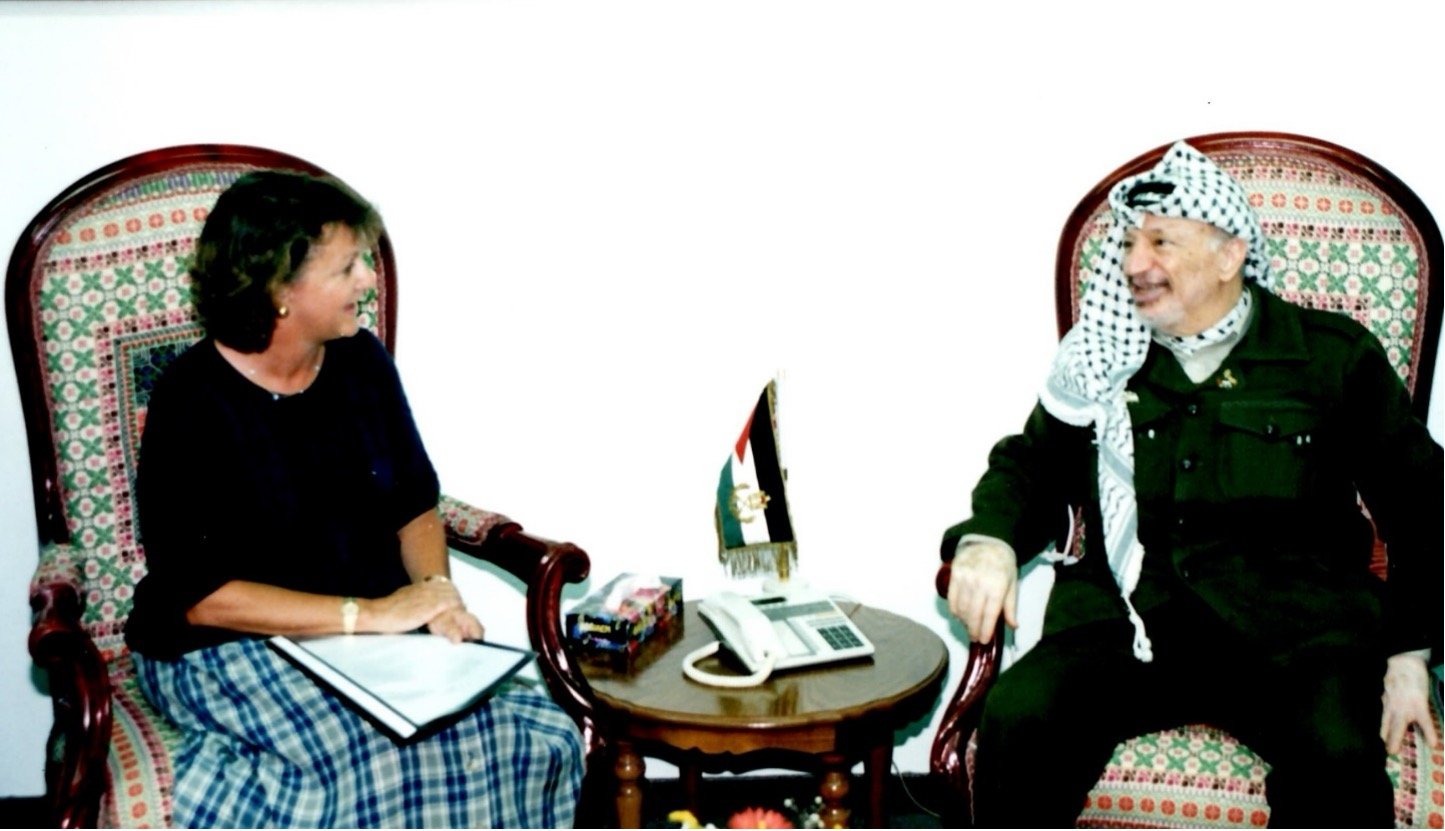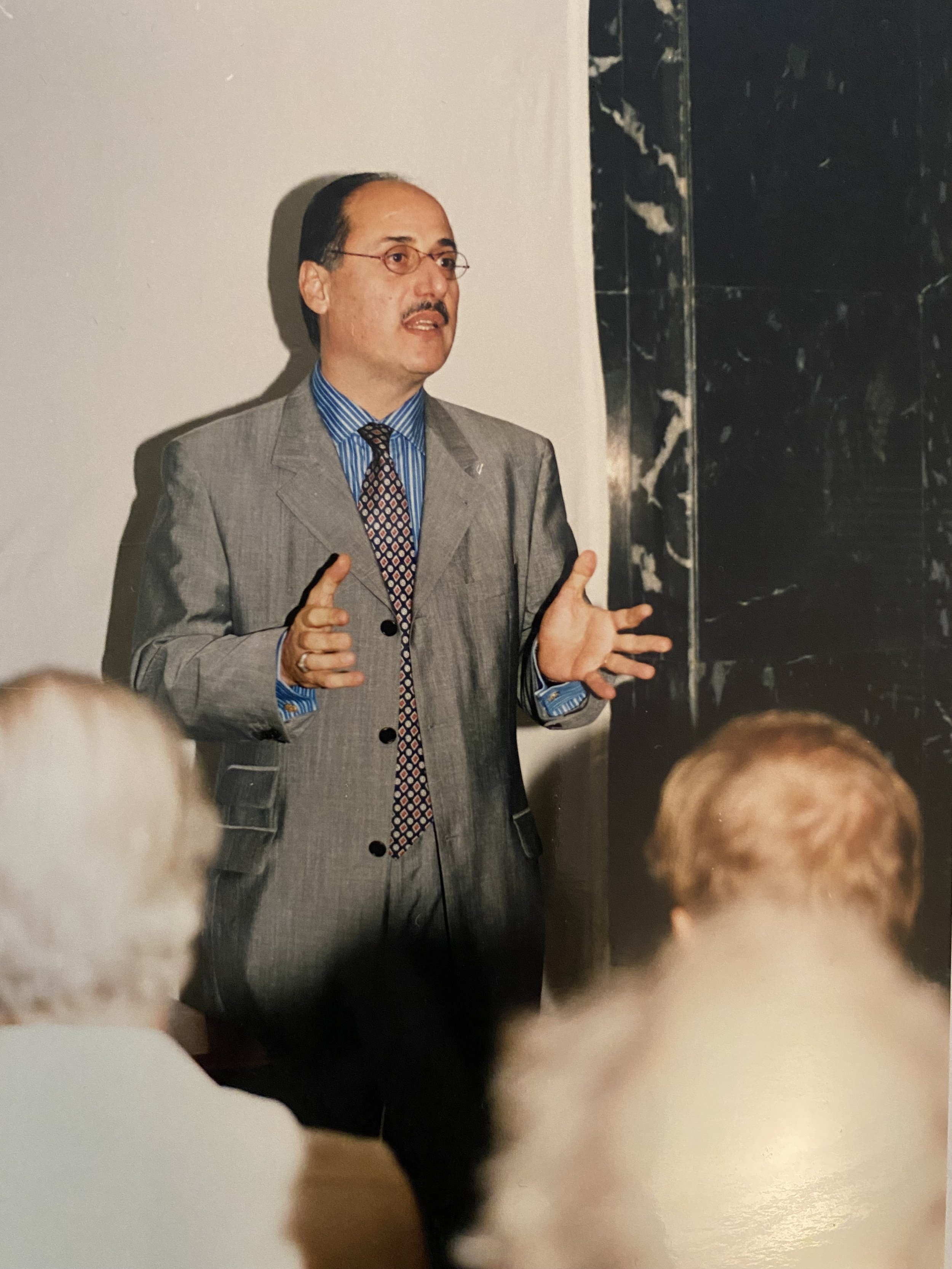The Reconciliation Walk
As the 900th anniversary of the First Crusade’s siege of Jerusalem loomed in 1999, a diverse group of Christians crossed the Middle East in step with the Crusaders.
Numbering some 2,500, they came from 27 nations and a wide range of Protestant and Catholic backgrounds.
Their goal was to take this inflammatory subject and transform it into a catalyst for dialogue and reconciliation.
They bore an apology for Crusader atrocities.
Cathy Nobles is the Training Director at St. Mary’s Centre for Peace and Reconciliation in Luton, UK. She recalls the impact of participating in the initiative.
“Listening to others’ views about the Crusades showed me the historical hurts and barriers that stood between us.
Real historical and current pain.
A simple ‘I am so sorry’ seemed to open the door to deeper discussions.
We wanted to listen and to understand how we could build a new future between Western Christians and Muslims and Jews.”

On the road to reconciliation

Reconciliation group received by Palestinian President Yasser Arafat

Turkey's senior most religious leader receives Reconciliation Walk delegation

The gesture was widely followed by global newspapers.

Ms Nobles shares the message of reconciliation with President Arafat

Ekrima Sa'id Sabri accepted the message as overseer of the Haram as-Sharif

Press conference opening the way for the Reconciliation Walkers in Lebanon where they were embraced across the spectrum of communities

Chief Rabbi Meir Lau received the messengers in Jerusalem's Great Synagogue

Chief Rabbi Meir Lau holds the formal message of penitence

Media in Turkey, Lebanon and the Holy Land spread the message of reconciliation widely

Family of eminent Shiite leader Musa al-Sadr encouraged the efforts of the Reconciliation walkers in Lebanon

Abbas Halabi, currently the Lebanese Minister of Education and Higher Education welcomed the Reconciliation Walk participants into Lebanon and his Druze Community and spent time with every group teaching them about his country's history and hopes.
Mehmet Ali Yılmaz received the message as Turkey’s senior Muslim clergyman.
“I am very moved…I hope this marks a turning point in Christian-Muslims relations. We have no right to hold you responsible for something from the past.”
Recep Tayyip Erdoğan’s office received the first group to arrive at a reception in Yıldız Palace.
Istanbul Deputy Mayor Ali Müfit Gürtuna spoke for the occasion.
“This project is very important to Turkey. You can see how much it means to the Turkish people when they line both sides of the road and applaud the walkers as they pass through!”
In Lebanon, General Secretary of the Islamic-Christian National Dialogue Committee Hares Chehab echoed the response of dozens of Shiite, Maronite and Orthodox Christian, Sunni and Druze community leaders and clergy.
“The Reconciliation Walk is a courageous step taken…in the necessity of purifying and rectifying the collective memory of Christians and Muslims from the scars of the past…and grave challenges on the threshold of the third Millennium…a brick in the cornerstone of real dialogue that would help us prevent the conflict of civilisations.”
Mayor of Ras Beirut Muhieddine Shehab
A leader of a Muslim militia in Lebanon's civil war, he became an exemplary advocate of confession and forgiveness. "We thought the other side was evil," Chehab said of the war years. "I was a military person, a Muslim who thought he was fighting an extension of the Crusades." His response to the Reconciliation Walk:
“As the Mayor of Ras Beirut…We have accepted your apology for the Crusades…walking among us like brethren and dear ones who know what is the meaning of humanity and make sacrifices for peace and tolerance. We have built together relations based on friendship, brotherly love, dialogue and understanding…. I call upon you to continue your activities and come back to Lebanon in order to resume your noble message. Hoping that you will accept our love and friendship forever.”
Sheikh Sayyed Hani Fahs, scholar and member of the Supreme Shiite Council
“Though the divide between us is deep and wide, though the memories are painful, there is nevertheless room for agreement and compromise…This desire for dialogue between us is a confirmation of the need that we have for harmony in human relationships. This is part of the God-created constitution of humankind…we must turn the miseries of history into shared lessons that enable us to avoid a repetition of these regrettable events in the future. We call upon you to continue in your endeavours, widen the circle of your activities, and to build towards a more permanent institution that will sow, grow, and produce the praise-worthy fruits of dialogue.”
Dr. Muhammad al Sammak, advisor to the Grand Mufti of the Republic of Lebanon and co-Secretary General of Lebanon's National Committee for Muslim-Christian Dialogue
“The Middle East is a place where more blood has been shed, more tears wept, and more prayers raised than any other place. All the ancient civilizations started here. Judaism, Christianity, and Islam started here…. Lebanon is part of the Middle East; it has 18 different religious communities; fourteen are Christians and four are Muslim… We realise Islamophobia is growing stronger in the West. The fact that you come to reconcile in the light of that is something very apparent. That’s why it is good that you have come to seek reconciliation. I like to define dialogue as ‘the art of seeing the truth in the point of view of the other’….I don’t have all the truth myself, including in my religion. I must respect others and look for the truth in another’s religion.”
Yasser Arafat, Chairman Palestine Liberation Organisation and President of the Palestinian National Authority
“Glory to God in the highest and peace to men on earth…Peace will come to our land when more people like you come with a message of peace.”
CHIEF RABBI OF ISRAEL MEIR LAU
Rabbi Lau recieved hundreds of Reconciliation Walker in the Grea Synagogue.
“This evil century in which we are living started with those events 900 years ago…We hope this is the end of it…where nobody lifts up his hand to bring pain. Blessed are you who come in the name of the Lord!”
Grand Mufti of Jerusalem and Palestine Ekrima Sa'id Sabri
Sheikh Sabri welcomed the Reconciliation Walkers and their prayerful pilgrimage to the Haram al-Sharif.
“Saladin El-Ayyubi followed the Islamic regulations of kindness in his dealings with the Crusaders…he did not kill the residents of Jerusalem as the Crusaders had when they killed 70,000 Muslims in the Al-Aqsa Mosque. Carry with you this message from Islam to Europe that Islam does agree on the heavenly religions and never committed any massacres against the Crusaders.”










